- Clone
- LG.3A10 (See other available formats)
- Regulatory Status
- RUO
- Other Names
- T14, S152, Tp55, TNFRSF7
- Isotype
- Armenian Hamster IgG
- Ave. Rating
- Submit a Review
- Product Citations
- publications
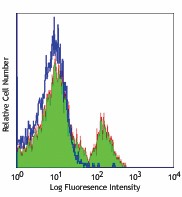
-

C57BL/6 mouse splenocytes stained with purified LG.3A10, followed by anti-Armenian hamster IgG FITC
| Cat # | Size | Price | Quantity Check Availability | Save | ||
|---|---|---|---|---|---|---|
| 124243 | 100 µg | 172€ | ||||
| 124244 | 1 mg | 542€ | ||||
CD27 is also known as S152 and T14. A member of the tumor necrosis factor receptor (TNFR) superfamily, it is a 45 kD protein expressed on peripheral T cells, memory B cells, NK cells, and thymocyte subset. Through its ligand, CD70, CD27 plays a key role in T cell and B cell interactions. Additionally, ligation of CD27 on naïve T cells may be important in their maturation to effector cells.
Product DetailsProduct Details
- Verified Reactivity
- Mouse, Rat, Human
- Antibody Type
- Monoclonal
- Host Species
- Armenian Hamster
- Immunogen
- Armenian hamster fibroblast line ARHO12 transfected with mouse CD27 cDNA
- Formulation
- 0.2 µm filtered in phosphate-buffered solution, pH 7.2, containing no preservative.
- Endotoxin Level
- Less than 0.01 EU/µg of the protein (< 0.001 ng/µg of the protein) as determined by the LAL test.
- Preparation
- The Ultra-LEAF™ (Low Endotoxin, Azide-Free) antibody was purified by affinity chromatography.
- Concentration
- The antibody is bottled at the concentration indicated on the vial, typically between 2 mg/mL and 3 mg/mL. Older lots may have also been bottled at 1 mg/mL. To obtain lot-specific concentration and expiration, please enter the lot number in our Certificate of Analysis online tool.
- Storage & Handling
- The antibody solution should be stored undiluted between 2°C and 8°C. This Ultra-LEAF™ solution contains no preservative; handle under aseptic conditions.
- Application
-
FC - Quality tested
IHC-F - Reported in the literature, not verified in house - Recommended Usage
-
Each lot of this antibody is quality control tested by immunofluorescent staining with flow cytometric analysis. For flow cytometric staining, the suggested use of this reagent is ≤ 0.5 µg per million cells in 100 µl volume. It is recommended that the reagent be titrated for optimal performance for each application.
- Application Notes
-
Additional reported applications (for the relevant formats) include: functional assay1,3 and immunohistomecial staining of acetone-fixed frozen sections2. The Ultra-LEAF™ purified antibody (Endotoxin < 0.01 EU/µg, Azide-Free, 0.2 µm filtered) is recommended for functional assays (Cat. Nos. 124243 & 124244).
- Application References
-
- Gravestein LA, et al. 1995. Int. Immunol. 7:551. (FA)
- Gravestein LA, et al. 1996. J. Exp. Med. 184:675. (IHC)
- Takeda K, et al. 2000. J. Immunol. 164:1741. (FA)
- Welner RS, et al. 2009. J. Immunol. 183:7768. PubMed
- Vicetti Miguel RC, et al. 2012. J. Immunol. 189:3449. PubMed
- White CA, et al. 2014. J Immunol. 193:5933. PubMed
- Iwata S, et al. 2015. Lupus. 24:695. PubMed
- RRID
-
AB_2813994 (BioLegend Cat. No. 124243)
AB_2813995 (BioLegend Cat. No. 124244)
Antigen Details
- Structure
- TNFR superfamily, 45 kD
- Distribution
-
Peripheral blood T cells, memory B cells, NK cells, thymocyte subset
- Function
- Costimulatory signal for T and B cell activation, T cell development
- Interaction
- TRAF2, TRAF5, CD27-binding protein (Siva)
- Ligand/Receptor
- CD70
- Cell Type
- B cells, NK cells, T cells, Thymocytes
- Biology Area
- Costimulatory Molecules, Immunology
- Molecular Family
- CD Molecules
- Antigen References
-
1. Hintzen RQ, et al. 1994. Immunol. Today 15:307.
2. Akiba H, et al. 1998. J. Biol. Chem. 273:13353.
3. Kobata T, et al. 1995. P. Natl. Acad. Sci. USA 92:11249.
4. Hendriks J, et al. 2000. Nat. Immunol. 1:433
5. Hintzen RQ, et al. 1994. Int. Immunol. 6:477
6. Camerini D, et al. 1991. J. Immunol. 147:3165 - Gene ID
- 21940 View all products for this Gene ID 939 View all products for this Gene ID 500318 View all products for this Gene ID
- UniProt
- View information about CD27 on UniProt.org
Related FAQs
- Do you guarantee that your antibodies are totally pathogen free?
-
BioLegend does not test for pathogens in-house aside from the GoInVivo™ product line. However, upon request, this can be tested on a custom basis with an outside, independent laboratory.
- Does BioLegend test each Ultra-LEAF™ antibody by functional assay?
-
No, BioLegend does not test Ultra-LEAF™ antibodies by functional assays unless otherwise indicated. Due to the possible complexities and variations of uses of biofunctional antibodies in different assays and because of the large product portfolio, BioLegend does not currently perform functional assays as a routine QC for the antibodies. However, we do provide references in which the antibodies were used for functional assays and we do perform QC to verify the specificity and quality of the antibody based on our strict specification criteria.
- Does BioLegend test each Ultra-LEAF™ antibody for potential pathogens?
-
No, BioLegend does not test for pathogens in-house unless otherwise indicated. However, we can recommend an outside vendor to perform this testing as needed.
- Have you tested this Ultra-LEAF™ antibody for in vivo or in vitro applications?
-
We don't test our antibodies for in vivo or in vitro applications unless otherwise indicated. Depending on the product, the TDS may describe literature supporting usage of a particular product for bioassay. It may be best to further consult the literature to find clone specific information.
Other Formats
View All CD27 Reagents Request Custom ConjugationCustomers Also Purchased
Compare Data Across All Formats
This data display is provided for general comparisons between formats.
Your actual data may vary due to variations in samples, target cells, instruments and their settings, staining conditions, and other factors.
If you need assistance with selecting the best format contact our expert technical support team.
-
Purified anti-mouse/rat/human CD27
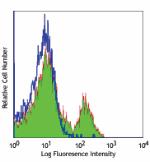
C57BL/6 mouse splenocytes stained with purified LG.3A10, fol... -
Biotin anti-mouse/rat/human CD27
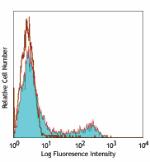
C57BL/6 mouse splenocytes stained with biotinylated LG.3A10,... -
FITC anti-mouse/rat/human CD27
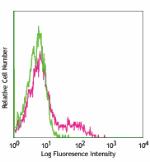
C57BL/6 mouse splenocytes stained with LG.3A10 FITC -
PE anti-mouse/rat/human CD27
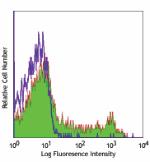
C57BL/6 mouse splenocytes stained with LG.3A10 PE 
Multiplexed IHC staining of PE anti-CD27 (clone LG.3A10) on ... -
APC anti-mouse/rat/human CD27
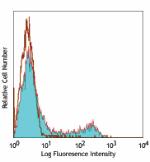
C57BL/6 mouse splenocytes stained with LG.3A10 APC -
PerCP/Cyanine5.5 anti-mouse/rat/human CD27

C57BL/6 mouse splenocytes were stained with CD45R/B220 APC a... -
PE/Cyanine7 anti-mouse/rat/human CD27
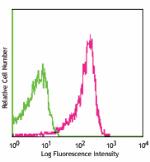
C57BL/6 mouse thymocytes stained with LG.3A10 PE/Cyanine7 -
Pacific Blue™ anti-mouse/rat/human CD27
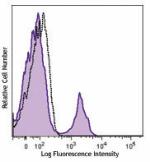
C57Bl/6 mouse splenocytes were stained with CD27 (clone LG.3... -
Alexa Fluor® 647 anti-mouse/rat/human CD27
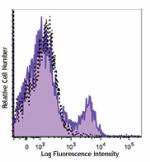
C57Bl/6 mouse splenocytes were stained with CD27 (clone LG.3... -
Alexa Fluor® 488 anti-mouse/rat/human CD27
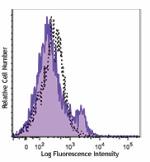
C57Bl/6 mouse splenocytes were stained with CD27 (clone LG.3... -
Brilliant Violet 421™ anti-mouse/rat/human CD27
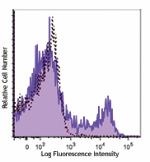
C57Bl/6 mouse splenocytes were stained with CD27 (clone LG.3... -
APC/Cyanine7 anti-mouse/rat/human CD27

C57BL/6 mouse splenocytes were stained with CD45R/B220 APC a... -
PE/Dazzle™ 594 anti-mouse/rat/human CD27
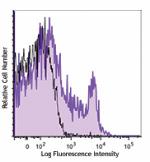
C57B/6 mouse splenocytes were stained with CD27 (clone LG.3A... -
Brilliant Violet 510™ anti-mouse/rat/human CD27
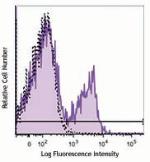
C57B/6 mouse splenocytes were stained with CD27 (clone LG.3A... -
Brilliant Violet 650™ anti-mouse/rat/human CD27
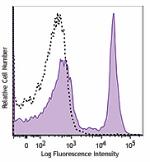
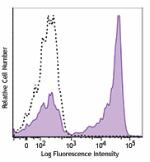
-
TotalSeq™-A0191 anti-mouse/rat/human CD27
-
Brilliant Violet 785™ anti-mouse/rat/human CD27

C57BL/6 mouse splenocytes were stained with CD45R/B220 PE an... -
APC/Fire™ 750 anti-mouse/rat/human CD27

C57BL/6 mouse splenocytes were stained with CD45R/B220 PE an... -
Alexa Fluor® 700 anti-mouse/rat/human CD27

C57BL/6 mouse splenocytes were stained with CD45R/B220 PE an... -
Ultra-LEAF™ Purified anti-mouse/rat/human CD27
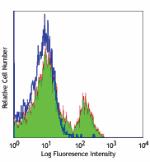
C57BL/6 mouse splenocytes stained with purified LG.3A10, fol... -
TotalSeq™-C0191 anti-mouse/rat/human CD27
-
TotalSeq™-B0191 anti-mouse/rat/human CD27
-
Brilliant Violet 605™ anti-mouse/rat/human CD27

C57BL/6 mouse splenocytes were stained with CD45R/B220 APC a... -
Spark PLUS UV395™ anti-mouse/rat/human CD27

C57BL/6 mouse splenocytes were stained with anti-mouse CD45R... -
Spark Blue™ 550 anti-mouse/rat/human CD27 (Flexi-Fluor™)
-
Spark Blue™ 574 anti-mouse/rat/human CD27 (Flexi-Fluor™) Antibody
-
Spark Red™ 718 anti-mouse/rat/human CD27 (Flexi-Fluor™)
 Login / Register
Login / Register 






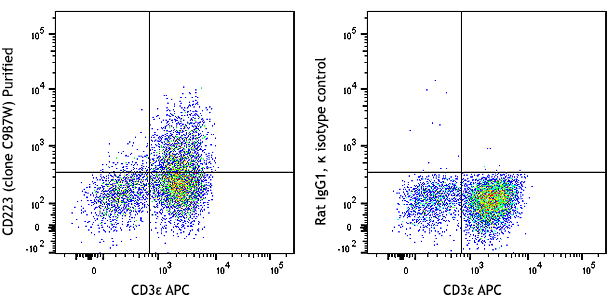
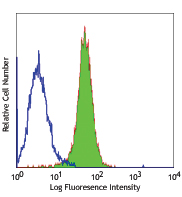
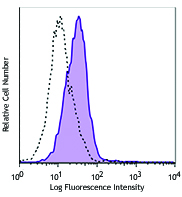
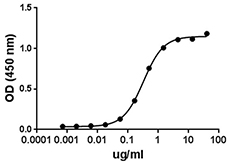



Follow Us